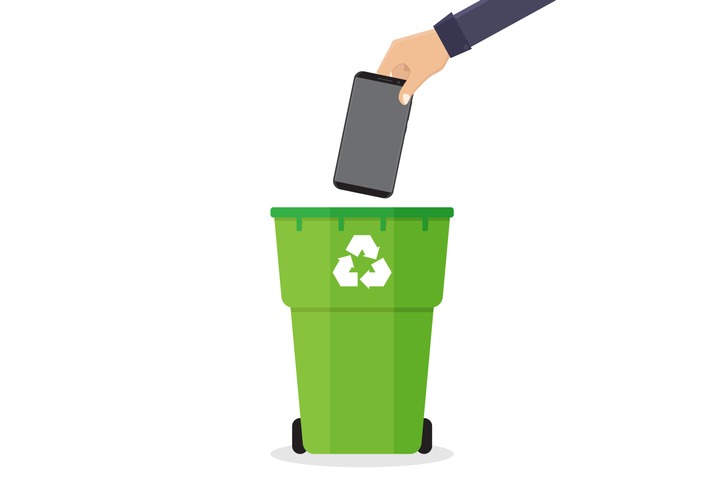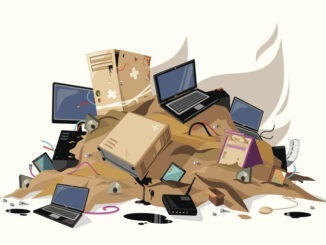
As the UK’s e-waste rubbish pile grows, businesses need solutions to help them reduce the e-waste they produce – and advice on what to do with the e-waste they already have.
Read the full article below or on page 26 in our May magazine.
E-waste consists of electronic products that are unwanted, not working and nearing or at the end of their ‘useful’ life – think monitors, laptops, printers and electrical cords. In the UK, the environmental audit committee’s Electronic Waste and the Circular Economy report states that 23.9kg of e-waste is produced, on average, per head of population and, according to Statista, annual e-waste production is on track to reach 75m metric tons this year.
According to Louise Marshall, director of ESG and organisational development at Brother UK, “Sustainability is increasingly influential in both consumer and business buying behaviour. In order to meet the demand, vendors and partners are increasing their capacity to provide services aimed at helping customers reduce their e-waste.”
Getting this waste down is an urgent requirement because e-waste is nasty stuff which can be extremely harmful to people and businesses when it is improperly disposed of. It’s:
- hazardous to human health – it contains numerous toxic chemicals that are dangerous for humans;
- hazardous to the environment – when dumped in a landfill, toxic substances like lead and mercury can leach into soil and water;
- a threat to data security it can contain confidential business data.
Dealers can and must build services and solutions that offer strategies for reducing, recycling and properly disposing of e-waste in order to mitigate these negative effects. Don’t know where to start? Here are some suggestions.
Extend the lifecycle of products
To ensure products have the longest possible lifecycles, carry out an audit to measure the areas where each product is most successful and where there needs to be improvement. Products should be audited for their:
- expected lifecycle;
- recyclability;
- repairability;
- manufacturer support.
Dealers can also assess their manufacturers and the sustainability of their products. It’s important to avoid ‘planned obsolescence’, where a device will only function well for a number of years before gradually failing, prompting repeat product purchasing; using sustainable manufacturers that offer products with longer lifecycles and spare parts for easy repairs will dodge this bullet. Both the EU and the UK introduced regulations in July 2021 requiring manufacturers to make spare parts available to professional repairers. “Repairing or remanufacturing with broken electronics, or previously faulty parts, eliminates more wastage and is something that should be widely encouraged,” says Boris Manev, head of sustainability and government affairs at Epson.
For Louise, reusability is a key part of Brother UK’s efforts to reduce e-waste. “We recognise the importance of reducing e-waste across our value chain. We have been working hard to build-in end-of-life management as part of our managed print service offering. At contract end, our hardware can be collected, assessed for suitability, and then either refurbished or recycled.”
Develop an e-waste collection and recycling programme
According to Statista, only 17.4% of global e-waste is known to be collected and properly recycled; however, for customers, it can be difficult to know the best options for e-waste collection and recycling. Dealers can make this process easier for customers by setting up an e-waste collection and recycling programme – customers will thank them for it, and loyalty will be increased accordingly. However, it isn’t just dealers who need to take recycling responsibility, as Boris points out.“Ultimately, it is the tech companies that are manufacturing these products and distributing them, en masse, so a large share of the responsibility for recycling these products needs to lie with them, as well as the consumer.”
For companies such as Brother UK, which have an e-waste collection and recycling programme in place, the benefit can be seen in the numbers. “We’re currently receiving an average of 3m toner cartridges a year for remanufacture or recycling, with over 40m having been processed in total,” Louise said. “Our European recycling operations have been recognised as carbon neutral; they run on 100% green energy and operate with zero waste to landfill.”
When building and promoting an e-waste collection and recycling programme, Boris advises dealers to keep sustainability at the core of their message. “Recycling programmes are a good example of how large corporations can offer consumers a simple way to reduce their environmental impact – but promoting recyclable materials and energy-efficient products, rather than prioritising profit, should also be front-of-mind.”
Be WEEE complaint
Following the changes to the UK’s Waste Electrical and Electronic Equipment (WEEE) policies, businesses are having to find new strategies for e-waste disposal. “In order to address the changes in policies, and achieve the government’s goal of a more circular economy, the way that we dispose of our electronics must evolve,” warns Boris.
By setting out these new targets, the government is minimising the risks posed by e-waste to people, the environment and businesses, and contributing to a society of sustainable production and consumption. However, for businesses, being WEEE compliant is only one piece of the sustainability puzzle.
“For years Xerox has played a part in protecting natural resources, managing WEEE in the best way for people and the environment – not only by ensuring compliance with WEEE policies but also by designing for sustainability and enabling a circular economy,” says Kevin Paterson, head of XBS UK and Xerox UK Channel at Xerox. “We register annual volumes of e-waste, and utilise a government-approved producer compliance scheme for collection, treatment, recovery and environmentally responsible disposal at no charge to customers.”
As sustainability continues to influence market demands and buying behaviours, the industry is set to see a shift in the services being offered. “Many manufacturers are enhancing their e-waste services to meet the demands of modern-day companies, and these will be important for resellers to be aware of,” Louise says. “Services such as consumable recycling and fleet management may, one day, form the main deciding factor for businesses purchasing electrical and electronic equipment – especially with the ever-growing number of environmentally-conscious consumers.”
Savvy dealers will make sure they’re on top of changing demand and innovative waste solutions for e-waste because, as Louise points out, “The range of products eligible for recycling will increase as technologies, and demand for sustainable business practices, improves globally.”


Be the first to comment